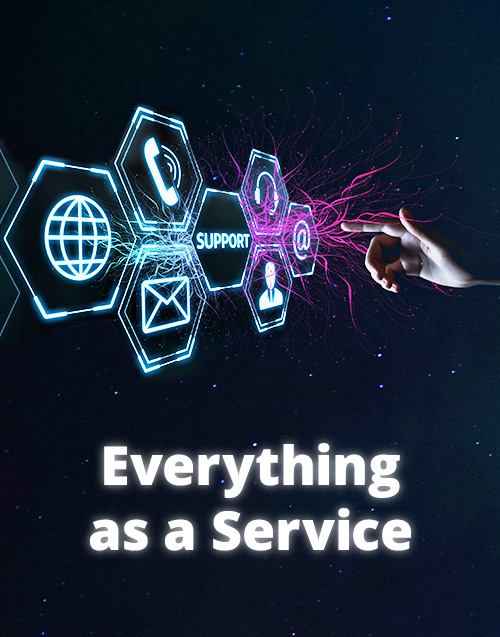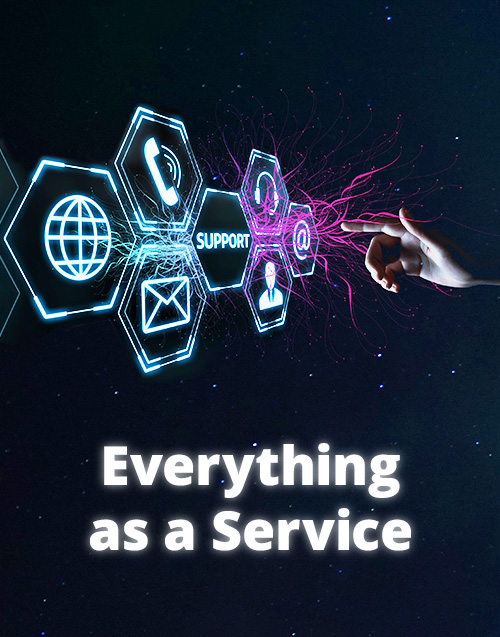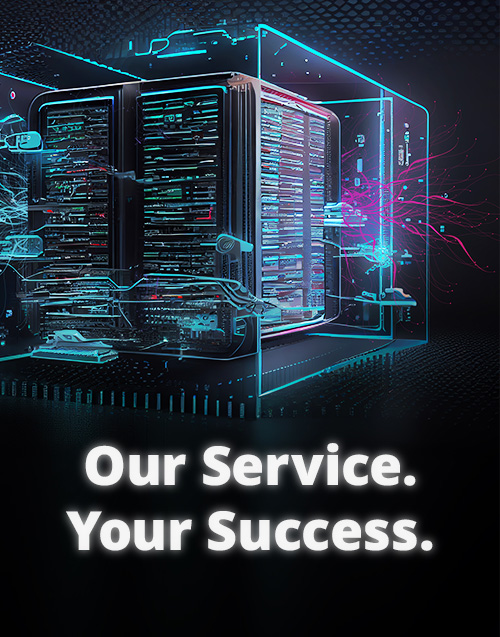What does “as a service” mean?
“As a service” describes a model in which IT services are provided via the internet or the cloud instead of having to be installed and operated on site. The major advantage of this is that companies can use and scale the services flexibly as required. Billing is usually based on the pay-per-use principle, i.e. according to actual consumption. However, the meaning of “as a service” can also be extended to the entire scope of services, for example by including technical expertise, support or additional added value in the service.
What types are there?
The following types can currently be roughly distinguished in the IT world. These cover different needs.
Software as a Service (SaaS) enables access to software applications via the internet. One example of this is programs such as Microsoft 365 or Google Workspace. The software does not need to be installed locally and updates are carried out automatically. However, SaaS can also relate to more far-reaching areas, such as IT security. Such solutions are often expensive, are offered in a wide variety of license models including add-ons etc. and usually require specialist knowledge.
Platform as a Service (PaaS) offers a platform for developing, providing and managing applications without having to manage the infrastructure. This development and operating environment not only enables developers to have the necessary tools and services at their disposal. It is also affordable and flexible as required. Conventional examples are the Google App Engine or Heroku.
Infrastructure as a Service (IaaS) provides the entire IT infrastructure such as servers, computing power, storage and networks, virtualized and via the Internet. This means that not everything has to be available, operated, maintained and updated in a separate IT environment. There is also often a form of self-administration in which companies can still manage, configure or adapt resources independently. The immense advantage is certainly that there is always access to state-of-the-art IT systems without having to physically procure and operate them yourself. Typical areas of application include data processing, i.e. when large amounts of data need to be collected, used and analyzed, as well as backup and disaster recovery. Examples include Amazon Web Services (AWS) or Microsoft Azure.
Everything as a Service (XaaS) is increasingly being discussed in this context. However, this merely refers to an extension of the classic “as a service” models already mentioned. It encompasses a further variety of services offered by cloud providers. XaaS is ultimately a collective term that reflects the trend in its entirety. It therefore includes the usual models, but also Database as a Service (DBaaS), Function as a Service (FaaS), Security as a Service (SECaaS), Device as a Service (DaaS), Artificial Intelligence as a Service (AIaaS) and many more.
Opportunities & Advantages
Switching to “as a service” models brings huge benefits for companies, regardless of their size or sector. Firstly, there are cost savings and efficiency. By eliminating the need to own hardware and the associated maintenance costs, companies can make significant savings. In addition, pay-per-use makes it possible to adjust expenditure precisely to actual requirements. This not only leads to cost efficiency, but also to better planning of IT budgets.
Scalability and flexibility should also be emphasized. “As a service” solutions are extremely scalable. Companies can quickly and easily add or reduce resources as required. This is valuable in times of growth as well as during seasonal peaks, unexpected loads or cost-cutting constraints. IT infrastructures can thus be adapted to business requirements in real time.
Last but not least, companies benefit from a certain simplicity. IT has become complex, and the various sub-topics require a great deal of expertise as well as time and personnel. Reducing these challenges and benefiting from the latest technologies, support, specialist expertise and added value - that sounds like a competitive advantage.
Challenges
However, there is also a “but”. Of course, it must be ensured that all data protection and compliance requirements are met. Choosing the right provider and adhering to security standards are crucial to minimize the risk of data loss or misuse.
Dependence on the “right” service provider is fundamental, not just in terms of guidelines. The partnership must be based on stable human, professional and, of course, technical pillars. Reliability, added service value, technological depth, etc. should be the deciding factors, not just a favorable price, for example.
Conclusion
The “as a service” model offers companies enormous opportunities to make their IT more efficient, more flexible, more modern and also more cost-effective. The ability to scale resources in line with demand enables companies to be adequately positioned on the market and even secure competitive advantages. The benefits far outweigh any risks and challenges. Every company should deal with this in good time in order to drive digitization forward individually and compete strongly and cost-effectively in the long term.
Our tip:
We have long recognized the potential and great future viability of “as a service”. What is sometimes presented as the new trend of today and tomorrow is an absolute maxim for us. As a managed services enabler, 1,400 of our customers are already benefiting from more core business and fewer IT challenges and burdens. With us, you have exactly one central point of contact for state-of-the-art infrastructures, solutions and services, for example via 55 experts in a 24/7 shift system and 35 specialists on call.
Our service innovations enable significant cost and resource savings, affordable access to leading technologies, the best expertise and reliable support and, of course, the customer-specific definition of the scope of service - predictable, targeted, secure. This enables small, medium-sized and large customers to significantly increase their competitiveness and innovative capacity.
















